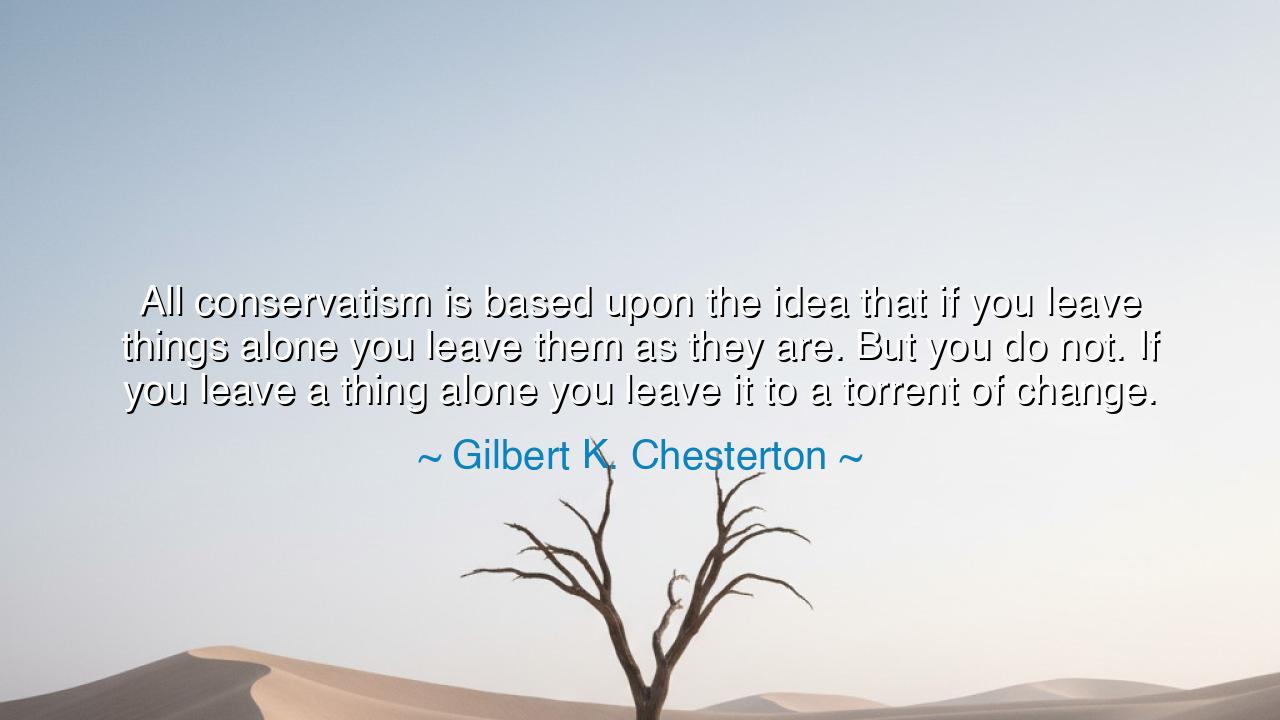
All conservatism is based upon the idea that if you leave things
All conservatism is based upon the idea that if you leave things alone you leave them as they are. But you do not. If you leave a thing alone you leave it to a torrent of change.






The words of Gilbert K. Chesterton — “All conservatism is based upon the idea that if you leave things alone you leave them as they are. But you do not. If you leave a thing alone you leave it to a torrent of change.” — ring with the paradoxical wisdom of the ages. They are not merely a reflection on politics, but a meditation on the nature of life itself. Chesterton, master of paradox, reveals a truth as old as time: that stagnation is an illusion, and that all things, left unattended, are claimed by the relentless river of change. To stand still is not to preserve — it is to surrender, silently, to decay.
In these words lies the heartbeat of existence. Every living thing — a tree, a city, a civilization, a soul — must be tended if it is to endure. Neglect is not neutrality; it is submission to entropy. The farmer who does not till his field will not preserve it — weeds will rise, roots will rot, and the soil will die. The ruler who does not guide his nation will not freeze it in time — corruption and division will creep in through the cracks. Even the heart that refuses to grow in love and compassion will not remain steady; it will wither into bitterness. Thus Chesterton teaches us that to “leave a thing alone” is not an act of preservation, but of abandonment.
He spoke these words in a world already trembling with the first signs of modern transformation — where old empires cracked, traditions faltered, and the ancient order of faith and reason stood at a crossroads. But his message stretches far beyond his own century. It speaks to every age that seeks to hold onto comfort while ignoring the march of time. He warns us that conservatism, when it mistakes stillness for strength, forgets that life is motion. To preserve a thing, one must renew it, as a fire must be fed if it is not to die. To defend tradition, one must keep it alive — not frozen in marble, but breathing, growing, enduring.
The ancients knew this truth well. Consider the great Roman Empire, whose might once spanned continents. Its leaders believed that by maintaining the old order, by resting upon the laurels of past triumphs, they could preserve eternity. But in their pride, they ceased to reform, ceased to listen, ceased to tend the spirit of their people. And while they celebrated their constancy, the empire rotted from within. Roads cracked, armies faltered, hearts grew weary. They left their civilization “alone,” and it did not remain — it fell to the torrent of change that Chesterton so vividly warns of.
In contrast, look to Japan after the Meiji Restoration — a nation that faced the tidal wave of modernity not with denial but with courage. Rather than clinging blindly to old ways, it chose to renew its traditions, blending them with the new without forsaking their soul. It understood that true preservation lies not in stillness, but in adaptation guided by wisdom. This is what Chesterton’s words mean in their deepest sense: that the conservative spirit, if it is to endure, must be creative — must guard what is sacred not by hiding it from time, but by letting it breathe through time.
Yet beyond politics and history, Chesterton’s insight speaks to every human heart. For in our own lives, too, we often believe that by doing nothing, we can “keep things the same.” We delay, we avoid, we resist growth, believing that in stillness we find safety. But the truth is otherwise: life changes even when we do not. Friendships fade if not nourished. Skills decay if not practiced. Dreams perish if not pursued. To leave one’s soul “alone” is to leave it to the torrent of change — and that torrent does not preserve; it erodes.
The lesson is clear: nothing endures through passivity. What is good must be protected, what is noble must be renewed, and what is sacred must be tended. To preserve anything — love, truth, justice, tradition — requires effort, vigilance, and care. For time is not a still pool, but a river ever flowing; if you do not steer, you are carried away. To hold fast to what matters, you must move with purpose.
So, my friend, let these words be a fire in your heart: do not mistake comfort for constancy, nor silence for stability. Tend your soul as a gardener tends his field, with patient labor and faithful renewal. Preserve not by standing still, but by walking forward with wisdom. For the world will always change — that cannot be stopped. But the wise man, like the steadfast oak, meets the storm not by resisting the wind, but by rooting himself deeper in the soil of purpose. Only then can he stand, and not be swept away by the torrent of change.






AAdministratorAdministrator
Welcome, honored guests. Please leave a comment, we will respond soon